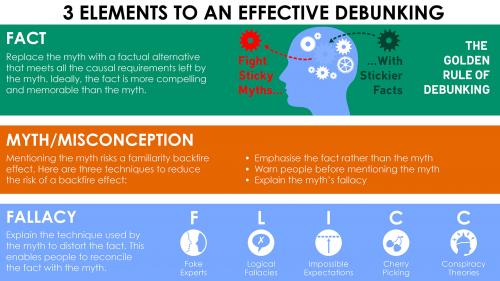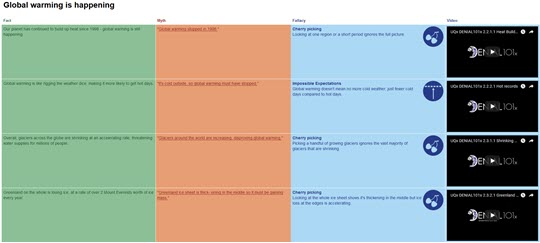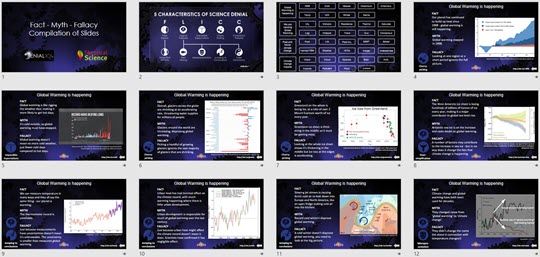New resource: The Fact-Myth-Fallacy slide-deck
Posted on 9 April 2018 by BaerbelW, jg
Many of you will already be familiar with the Fact-Myth-Fallacy structure of a successful debunking. For a refresher, John Cook's post about "Inoculation theory: Using misinformation to fight misinformation" is a good primer on the topic.

As examples for how to make use of this structure, we have short debunkings of many of the myths covered in our MOOC Denial101x readily available on an overview page, which also includes the relevant video lecture for each of them. The list is also available as a PDF-file:
Based on this FMF-page, I created a slide-deck with one page for each debunking and an index-page utilising the short URL "code" for each rebuttal to quickly access them. Instead of a video, each slide includes a graphic to drive home the main point of the debunking. Several of the graphics were created by John Garrett (jg) specifically for this slide-deck. They have been added to our graphics resources.
This slide-deck can serve several purposes. It can be used stand-alone to briefly explain some aspects of climate science. It can be tacked on to presentations used in public talks where a Q&A or discussion section is included at the end. There's always a chance that somebody who disagrees with or outright denies the science is in the audience just waiting to raise her or his hand after your talk! Armed with slides like the ones presented here, you'll be prepared to tackle (most of) them - and while doing so, show the rest of the audience that the objection has already been tackeled and debunked.
Obviously, this slide-deck is just a start. More debunkings can be added, graphics can be replaced or tweaked as needed, and the format can be adapted to other topics.
You can download the slide-deck either as a PDF (2.4MB), as a PDF with white background for printing (2.7MB) or PPTX (14MB). The navigation from the index page to each debunking and back works in both versions but the PPTX also includes some animations where the content of each slide is revealed in stages.
Here is hoping that this will become a helpful resource! Please let us know in the comments if and where you made use of it and how it went. Also feel free to post suggestions for other/better graphics to use on individual slides.































 Arguments
Arguments

































Looking at the very first graphic (3 elements to an effective debunking) makes me think we need to invent a new word:
mythconception!
Very powerful slide show and nicely concise, but I still think it would read better "myth, fact, fallacy". Its more traditionally ordered. I thought an article on this website discussed how having the problem myth up front didn't reinforce the problem in peoples minds?
nigelj @2
Thanks for the feedback!
Check http://sks.to/debunk for a comment regarding the familiarity backfire effect. Bottom line seems to be that it doesn‘ hurt quite as much as thought earlier to mention the myth but it‘s still the better option (my interpretation) to do fact-myth-fallacy. Especially if people don‘t pay close enough attention to what they read or hear, what gets to them first has the best chance to stick.
Great resource! Many thanks.
Bärbel, jg – A lot of work has been put into this and it was well worth it. Very informative.
This campaign to convince the unconvincible is bound to fail just like all our other campaign. Save the flowers save the bees, save the snails save the trees. All is a waste of time unless we get the root problem solved. http://mtkass.blogspot.co.nz/2018/01/wasted-effort.html
william @6
This isn‘t a resource to convince the unconvicible but to inoculate those still „on the fence“ or disengaged against their misinformation.
Dissenting opinions are not allowed in the process of debunking. That makes debunking very effective.
[DB] This is an evidence-based venue. While you are welcome to entertain a dissenting opinion, without credible evidence found in relevant scientific (peer-reviewed) sources to support them, you are not welcome to share those dissenting opinions in this forum and represent them as factual.
Please read the Comments Policy for this site, and ensure that future comments are constructed to comply with it, before making further comments on it.